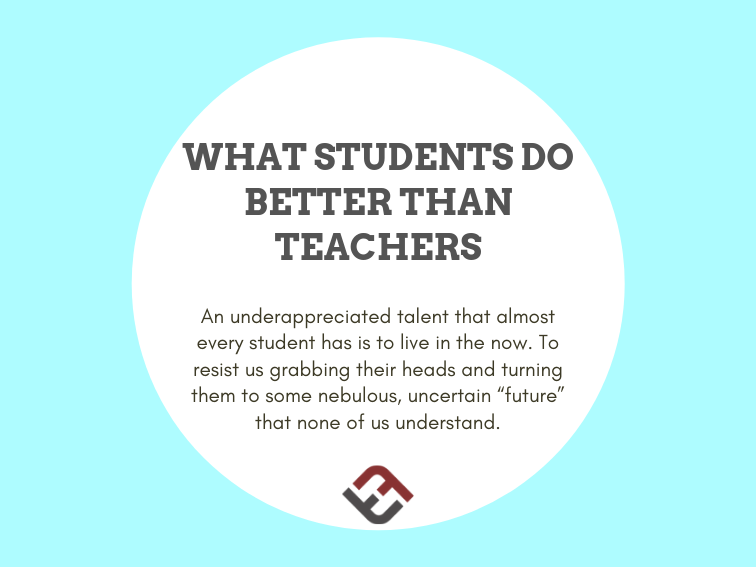Here’s What Students Do Better Than Teachers
Getting students to ‘think about their future’ turns into a lecture about bills and ‘life’; we project our insecurities and failures on them.

What Do Students Do Better Than Teachers?
by Terry Heick
Preface: I’m making very generalized, blanket statements about children that obviously don’t apply to every student and certainly is not true of every student all the time. My goal is to speak about perceived tendencies as I have witnessed them.
You can ask your students what they’re interested in—what they’re curious about—but that’s not the right question, because they might not know and are even more likely not to know it well.
Or don’t know they know.
A big part of communicating with children (of any age) is the terms and form of conversation.
Terms as in why you’re communicating, who is a part of the communication process, and the medium you’re communicating through (if any).
Form as in the aesthetic of the communication—the language, tone, and schema.
That last bit—schema—hints at background knowledge. Those symbols that have meaning for students. The schema and syntax and language patterns matter as much as the topics of conversation. And this is an important distinction. Moving from exchanging words to exchanging ideas is a big shift that doesn’t happen just because there is a question and answer exchange. There is a certain trust inherent in any meaningful communication:
I trust you to truly listen and understand me.
You trust me to use symbols and forms that mean the same thing to you as they do to me.
We each trust that we’re both open to communicating, and vulnerable to new ideas.
The Solution
Terms and form.
Asking students what they’re interested in breaks rules beneath both of these banners. It’s an adult-centered question—asked on adult terms expressed in an adult form.
The same goes with other questions that are entirely valid for you and I as adults:
What do you want to create?
What are you curious about?
What inspires you?
What do you want your work to be?
Or the most cliché, adult-centered version of all, “What do you want to be when you grow up?”
A solution can be found if we shift the terms and forms of communication. Iterate the question so that it doesn’t drip with adult stink and the morass of ‘accountability.’
Children have difficulty seeing past this afternoon. Those that think to the coming weekend are visionaries. Traditionally, getting them to ‘think about their future’ turns into a lecture on jobs and bills and ‘life’; we project our insecurities and failures on them.
Children are spontaneous. Rebellious. Naturally innovative. Emotional. Adaptable. Forgiving. Fragile–and curiously strong. They can make a game out of almost anything. But an underappreciated talent that almost every student has is to live in the now. To resist us grabbing their heads and turning them to some nebulous, uncertain ‘future’ that none of us understand.
While many children (and older teenagers) are increasingly aware of sociopolitical issues, they’re also a kind of future blind–but their ability to see the here and now is off the chart. So seek out terms and forms that resonate with them. Think in music and language and chaos and love in pursuit of the now.
Their physical location right now. Their potential collaborators now. The possibilities now. The opportunity now. Their needs now. The worthwhile challenges that are within their reach right now.
Point at a range of mountains and ask them earnestly, “Which one should we climb?”
What Students Do Better Than Teachers
